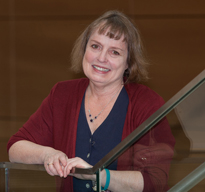Jeanne Lawrence, PhD
Professor and Interim Chair of the Department of Cell and Developmental Biology at the University of Massachusetts Medical School.

Jeanne Lawrence is an internationally recognized leader in the field of epigenetics, chromosome regulation, and non-coding RNAs, whose work reflects her inter-disciplinary background in developmental biology and clinical genetics. She is currently Professor and Interim Chair of the Department of Cell and Developmental Biology at the University of Massachusetts Medical School. After receiving a B.A. in Biology and Music from Stephens College, she earned her M.S. in Human Genetics and Counseling from Rutgers University and a Ph.D. in Developmental Biology from Brown University.
Dr. Lawrence’s work bridges fundamental questions in epi-genome biology with human clinical genetics, as she is interested in translating basic science discovery to problems that impact people, particularly Down Syndrome. In her earlier work, she received awards and patents for the development of single-copy gene and nuclear RNA FISH (fluorescence in situ hybridization) technology, which made possible the investigation of gene and RNA organization directly within cell nuclei. This allowed her lab to first show that RNA from the X-linked XIST gene is expressed exclusively from and “coats” the inactive X-chromosome in female cells, where this novel RNA induces heterochromatin modifications which silence transcription across the chromosome. These studies were key to establishing the precedent that a large “non-coding” RNA (XIST RNA) could function itself as a regulator of chromatin. XIST now remains the preeminent paradigm for ncRNA regulation of the epigenome.
Most recently, her lab has demonstrated that the large XIST gene could be accurately targeted into one extra chromosome 21 in iPS cells from a Down syndrome patient. Most importantly, the RNA effectively silenced expression of genes across the extra chromosome 21. This novel approach now provides several new avenues for translational research into human Down Syndrome cell pathology in vitro, and opens the longer-term possibility of “chromosome therapy” in vivo for aspects of trisomy 21 (and other trisomys). Dr. Lawrence’s lab is currently working to demonstrate feasibility that XIST- mediated silencing of a trisomic chromosome can correct or mitigate pathology in mouse models of DS, and is also the engineered human DS pluripotent stem cells as a correctable “disease-in-a-dish”, to understand cellular differences that underlie various aspects of Down Syndrome.
Dr. Lawrence has been honored for development of highly sensitive FISH technologies now used round the world and has received awards from the National Center for Human Genome Research, American Society of Cell Biology, German Society for Biochemistry, Muscular Dystrophy Association, Charles H. Hood Foundation and the John Merck Fund. She has served on the NIH Advisory Council for Human Genome Research, numerous NIH review panels, and currently serves as as monitoring editor for the Journal of Cell Biology.

 Experience our inspirational and groundbreaking videos and photos. Our children and self-advocates are beautiful AND brilliant!
Experience our inspirational and groundbreaking videos and photos. Our children and self-advocates are beautiful AND brilliant! Make sure your local Representatives are on the Congressional Down Syndrome Task Force.
Make sure your local Representatives are on the Congressional Down Syndrome Task Force.